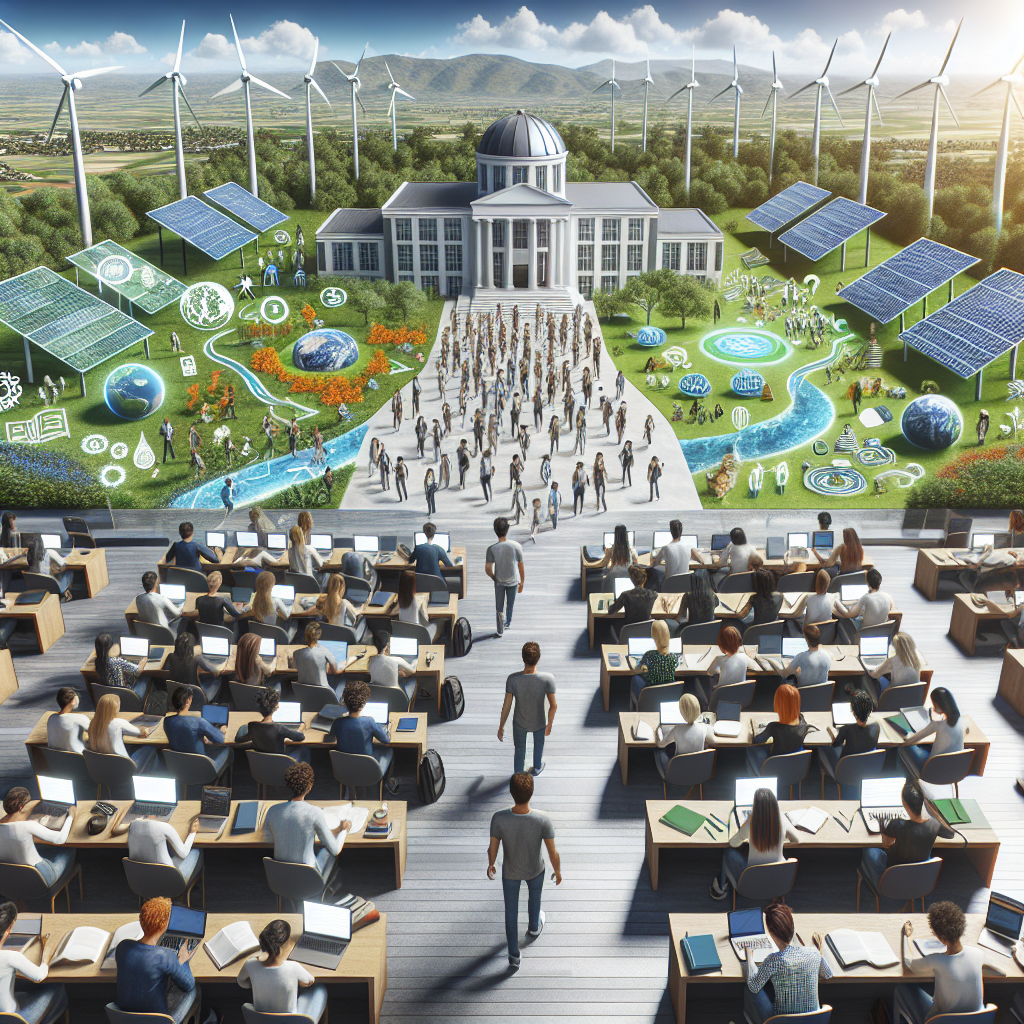Understanding Sustainability in the Modern World
Sustainability has become a pivotal concept in today’s world, encompassing various dimensions such as environmental integrity, economic viability, and social equity. As global challenges such as climate change, resource depletion, and social inequality intensify, the importance of sustainability in modern society cannot be overstated. Governments, businesses, and individuals are increasingly recognizing the need to adopt sustainable practices to ensure a balanced coexistence with our environment.
In the modern framework, sustainability is not merely about conservation; it is about creating systems that are resilient and adaptable. This involves a comprehensive understanding of the interconnectedness of ecological, social, and economic systems. To illustrate the complexity and breadth of sustainability, consider the following components:
- Environmental Sustainability: Focuses on reducing carbon footprints, conserving natural resources, and protecting ecosystems.
- Economic Sustainability: Involves creating economic systems that provide equitable access to resources and opportunities without compromising future generations.
- Social Sustainability: Aims to foster inclusive communities that promote well-being and social justice for all individuals.
Understanding these components requires a multifaceted approach, often necessitating collaboration across different sectors and disciplines. It is within this context that the role of sustainability professionals becomes crucial. They are tasked with integrating sustainable development goals into various projects and policies, ensuring that initiatives align with broader global objectives.
To further explore the complexities of sustainability, consider the following data visualization that illustrates the interdependence of sustainability pillars:
| Pillar | Key Focus Areas | Challenges |
|---|---|---|
| Environmental | Climate Action, Biodiversity, Pollution Control | Resource Depletion, Habitat Loss |
| Economic | Job Creation, Innovation, Infrastructure Development | Inequality, Economic Instability |
| Social | Health, Education, Community Engagement | Poverty, Discrimination |
In conclusion, a career in sustainability requires a deep understanding of these interdependencies and the ability to navigate complex challenges. As the world moves towards a more sustainable future, professionals in this field will play a vital role in driving innovation and implementing solutions that promote long-term ecological balance and human prosperity.
The Growing Demand for Sustainability Professionals
The demand for sustainability professionals has surged in recent years, driven by an increasing global awareness of environmental issues and the need for sustainable practices across various industries. Businesses are recognizing the importance of integrating sustainability into their operations, not just as a means of compliance but as a strategic advantage. This shift is creating a wide range of opportunities for individuals skilled in sustainability practices.
Industry Demand
- Corporate Responsibility: Companies are increasingly looking for experts who can help them meet environmental, social, and governance (ESG) criteria.
- Renewable Energy: With the global push towards renewable energy, there is a growing need for skilled professionals in solar, wind, and other sustainable energy sectors.
- Urban Planning and Development: As cities focus on sustainable growth, urban planners with sustainability expertise are in high demand.
Data Insights
| Sector | Projected Growth (2023-2030) | Key Roles |
|---|---|---|
| Renewable Energy | 35% | Energy Analyst, Project Manager |
| Corporate Sustainability | 25% | Sustainability Consultant, ESG Specialist |
| Urban Development | 20% | Urban Planner, Environmental Engineer |
The educational pathways for aspiring sustainability professionals are also expanding, with more universities offering specialized programs and degrees. This trend underlines the industry’s recognition of sustainability as not just a niche interest but a critical component of modern business strategy. As the demand for sustainability professionals continues to grow, so too will opportunities for career advancement and specialization within the field.
Key Skills for a Career in Sustainability
Embarking on a career in sustainability requires a diverse set of skills that blend technical knowledge with a passion for environmental stewardship. Analytical skills are essential for identifying and solving complex environmental challenges. Professionals must be adept at interpreting data and using it to inform sustainable practices. Equally important are communication skills, as sustainability experts often need to convey complex ideas to diverse audiences, from stakeholders to the general public.
Project management is another critical skill, as sustainability initiatives often involve coordinating multiple teams and resources. Successful professionals in this field must be able to lead projects from conception to completion, ensuring that sustainability goals are met on time and within budget. Furthermore, problem-solving skills are crucial for developing innovative solutions to environmental issues, requiring a creative and forward-thinking mindset.
The following table outlines some of the key skills and their relevance in sustainability roles:
| Skill | Description | Relevance |
|---|---|---|
| Analytical Skills | Ability to analyze data and trends to inform sustainable practices. | High |
| Communication Skills | Conveying complex sustainability concepts effectively to various audiences. | High |
| Project Management | Coordinating projects to meet sustainability goals within time and budget constraints. | Medium |
| Problem-Solving Skills | Developing innovative solutions to environmental challenges. | High |
In addition to these skills, a strong understanding of environmental science, policy, and regulations is vital for those looking to make a significant impact in sustainability. Knowledge of local and global environmental laws enables professionals to navigate and influence policy changes. Moreover, an understanding of corporate social responsibility (CSR) and sustainable business practices is increasingly important as organizations strive to improve their environmental footprint.
Educational Pathways to Sustainability Careers
Embarking on a career in sustainability often requires a well-rounded education that combines scientific knowledge, practical skills, and an understanding of complex environmental systems. Many universities and colleges now offer specialized programs that cater to students interested in sustainability. These programs range from bachelor’s degrees in environmental science to master’s degrees in sustainable business practices. Core subjects typically include environmental policy, ecology, resource management, and renewable energy technologies. Additionally, interdisciplinary studies that incorporate economics, sociology, and political science provide a comprehensive foundation for tackling sustainability challenges.
For those looking to advance their careers, pursuing higher education can be particularly beneficial. Master’s programs often offer concentrations in areas such as climate change policy, sustainable agriculture, and urban planning. Online courses and certifications have also gained popularity, offering flexibility for professionals looking to pivot into the sustainability sector. Certifications such as the LEED (Leadership in Energy and Environmental Design) and Certified Energy Manager (CEM) can enhance a professional’s credentials and demonstrate expertise in specific areas of sustainability.
Various educational institutions provide opportunities to gain hands-on experience through internships and fieldwork. These experiences are invaluable in equipping students with the practical skills needed to address real-world environmental issues. Below is a table summarizing typical courses and programs available at different educational levels:
| Education Level | Programs Offered | Key Subjects |
|---|---|---|
| Bachelor’s | Environmental Science, Sustainability Studies | Ecology, Environmental Policy, Resource Management |
| Master’s | Sustainable Business, Climate Change Policy | Renewable Energy, Urban Planning, Sustainable Development |
| Certifications | LEED, CEM | Energy Efficiency, Green Building, Environmental Impact |
In conclusion, the educational pathways to a career in sustainability are diverse and adaptable, catering to a wide range of interests and career goals. Whether through traditional degree programs or specialized certifications, aspiring sustainability professionals have numerous options to acquire the necessary knowledge and skills. As the field continues to evolve, staying informed about emerging trends and technologies will be crucial for those seeking to make a meaningful impact.
Industrial Sectors Embracing Sustainability
As global awareness of environmental issues grows, several industrial sectors are increasingly integrating sustainability into their core operations. These sectors recognize the importance of sustainable practices not only for ecological health but also for long-term economic viability. Industries such as energy, manufacturing, and agriculture are leading the charge by adopting innovative technologies and practices to reduce their environmental footprint.
In the energy sector, there is a significant shift towards renewable sources such as solar, wind, and hydroelectric power. The demand for professionals skilled in these technologies is surging as companies aim to decrease reliance on fossil fuels. Similarly, the manufacturing industry is adopting sustainable methods, including energy-efficient production processes and waste reduction strategies. This trend is fueled by both consumer demand for eco-friendly products and regulatory pressures to minimize environmental impact.
Another key player is the agriculture sector, which is increasingly prioritizing sustainability through practices like organic farming and precision agriculture. These methods not only enhance food security but also promote soil health and biodiversity. Moreover, sectors such as transportation and construction are also making strides by implementing electric vehicles and green building techniques, respectively, to create more sustainable urban environments.
Below is a table highlighting the key sectors and their respective sustainable practices:
| Sector | Sustainable Practices |
|---|---|
| Energy |
|
| Manufacturing |
|
| Agriculture |
|
| Transportation |
|
| Construction |
|
Challenges and Opportunities in Sustainability Jobs
The field of sustainability offers a diverse range of opportunities for professionals interested in making a positive impact on the environment and society. However, like any career path, it comes with its own set of challenges. One significant challenge is the need for specialized knowledge and skills. Professionals in sustainability must often possess expertise in environmental science, policy, or engineering, as well as a strong understanding of regulatory frameworks and sustainable practices.
Despite these challenges, the opportunities in sustainability are plentiful. The growing global emphasis on environmental conservation and climate change mitigation has led to an increased demand for sustainability professionals across various industries. This demand translates into job opportunities in sectors such as renewable energy, waste management, and corporate sustainability. Additionally, the push for sustainable business practices has created roles for sustainability consultants and managers who can guide organizations toward more environmentally friendly operations.
To better understand the landscape of sustainability jobs, consider the following data visualization:
| Sector | Opportunities | Challenges |
|---|---|---|
| Renewable Energy |
|
|
| Waste Management |
|
|
Moreover, professionals entering the field must be prepared to adapt to rapidly evolving technologies and methodologies. The interdisciplinary nature of sustainability work means that collaboration across various sectors is often necessary. This can present both an opportunity and a challenge, as professionals must be skilled in communication and teamwork.
In conclusion, while sustainability jobs present certain challenges, the opportunities they offer are vast and varied. With the right skills and a commitment to lifelong learning, professionals can build rewarding careers that contribute to a more sustainable future.
Impact of Technology on Sustainability Careers
The rapid advancement of technology has significantly influenced sustainability careers, reshaping the way professionals approach environmental challenges. Technology plays a dual role in both creating new opportunities and presenting fresh challenges. On the one hand, it enables improved data collection and analysis, leading to more informed decision-making. For example, the integration of Internet of Things (IoT) devices in environmental monitoring allows for real-time data gathering, which is crucial for effective resource management.
Moreover, technology has facilitated the development of innovative solutions such as renewable energy systems and smart grids. These advancements have not only created new jobs but also necessitated a shift in skill requirements. Professionals in sustainability now need to be proficient in data analysis, digital literacy, and an understanding of complex technological systems. A 2018 survey by the International Renewable Energy Agency (IRENA) highlighted that the renewable energy sector alone employed over 11 million people worldwide, a number that continues to grow with technological advancements.
However, the integration of technology in sustainability careers is not without its challenges. The rapid pace of technological change means that continuous learning and adaptation are essential. There is also a growing need for interdisciplinary collaboration, as solving sustainability issues often requires expertise from fields such as engineering, environmental science, and information technology. The table below illustrates the diverse skill sets required in various sustainability roles:
| Role | Key Skills |
|---|---|
| Environmental Data Analyst | Data Analysis, GIS, Statistical Software |
| Renewable Energy Engineer | Engineering Principles, Renewable System Design, Project Management |
| Sustainability Consultant | Strategic Planning, Policy Analysis, Communication Skills |
In conclusion, while technology undoubtedly enhances the scope of sustainability careers by introducing new tools and methodologies, it also demands a continuous evolution of skills and knowledge. As the field progresses, staying abreast of technological trends and their implications on sustainability practices will be crucial for professionals aspiring to thrive in this dynamic career path.
Future Trends in Sustainability Employment
The future of sustainability employment is promising, driven by an increasing global emphasis on environmental conservation and sustainable development. As businesses and governments worldwide recognize the urgency of addressing climate change, the demand for skilled sustainability professionals is expected to grow significantly. This trend is supported by the adoption of international agreements such as the Paris Agreement, which calls for substantial reductions in greenhouse gas emissions. Companies are increasingly integrating sustainability into their core operations, creating a surge in job opportunities across various sectors.
Key areas expected to witness significant growth include renewable energy, sustainable agriculture, and green building. According to a report from the International Renewable Energy Agency (IREA), employment in the renewable energy sector is projected to reach nearly 24 million by 2030. Similarly, the green building industry is set to expand, with more construction projects seeking LEED certification to meet environmental standards. The focus on sustainable agriculture is also increasing, driven by a need to produce food in an environmentally friendly manner.
The evolving landscape of sustainability employment will require professionals to possess a diverse skill set. Expertise in data analysis, project management, and environmental science will be essential. Furthermore, the ability to adapt to new technologies and regulations will be crucial as the industry continues to evolve. Educational institutions are responding to this demand by offering specialized programs and certifications in sustainability, equipping graduates with the knowledge required to succeed in this dynamic field.
Below is a table illustrating projected job growth in key sustainability sectors:
| Sector | Projected Job Growth by 2030 |
|---|---|
| Renewable Energy | 24 million |
| Sustainable Agriculture | 15% increase |
| Green Building | 10% annual growth |
The future of sustainability employment is not only about growth in numbers but also about diversification in roles and responsibilities. As the industry matures, new career paths are emerging, ranging from sustainability consultants to policy advisors and environmental educators. These roles will be integral in guiding organizations toward eco-friendly practices and ensuring compliance with environmental regulations. As such, sustainability is poised to be a defining career of the future, offering both challenges and opportunities for those passionate about making a positive impact on the planet.
Networking and Professional Development
Networking plays a crucial role in establishing a successful career in sustainability. Building connections within the industry can provide valuable insights into emerging trends, potential job opportunities, and best practices. Attending conferences, workshops, and seminars dedicated to sustainability can be an excellent way to meet like-minded professionals and experts in the field. Engaging with online forums and professional networks on platforms like LinkedIn can also facilitate meaningful interactions and collaborations. Establishing a diverse network can open doors to mentorship opportunities, which can be invaluable for career growth and development.
In addition to networking, professional development is essential for staying competitive in the sustainability sector. Continuous learning through certifications and specialized courses can enhance one’s expertise and credibility. Many organizations offer professional development programs that focus on areas such as environmental management, renewable energy, and sustainable business practices. Engaging in these programs not only broadens skill sets but also demonstrates a commitment to the field. Below is a table outlining some popular certifications and courses in sustainability:
| Certification/Course | Provider | Focus Area |
|---|---|---|
| LEED Accredited Professional | U.S. Green Building Council | Green Building |
| Certified Sustainability Professional | International Society of Sustainability Professionals | Sustainability Management |
| Renewable Energy Professional | Association of Energy Engineers | Renewable Energy |
Furthermore, engaging in professional development activities such as webinars, online courses, and workshops can keep individuals updated on the latest advancements and policy changes in the sustainability space. Many of these resources are available online, providing flexible learning options for busy professionals. By actively participating in such initiatives, individuals can refine their skills and adapt to the dynamic nature of the sustainability sector, ultimately enhancing their career prospects. Below is a list of recommended online platforms for professional development in sustainability:
- Coursera
- edX
- FutureLearn
- LinkedIn Learning
Sustainability and Corporate Responsibility
Sustainability and corporate responsibility have become integral strategies for businesses aiming to thrive in today’s environmentally-conscious market. Companies are increasingly recognizing the importance of integrating sustainable practices not only to meet regulatory requirements but also to enhance their brand reputation and competitiveness. Corporate responsibility involves a commitment to ethical practices, which includes minimizing environmental impact, ensuring fair labor practices, and engaging in philanthropy.
Incorporating sustainability into business operations requires a comprehensive approach. This often involves setting measurable goals and reporting on progress, which can be driven by dedicated sustainability professionals. These roles are crucial as they help businesses navigate the complexities of sustainable practices, ensuring they align with both short-term objectives and long-term organizational vision. Below is a table illustrating key areas of focus for sustainability within corporate responsibility:
| Key Areas | Description |
|---|---|
| Environmental Management | Implementing systems to reduce waste, conserve energy, and manage resources efficiently. |
| Social Equity | Promoting diversity, equity, and inclusion within the workplace and supply chain. |
| Ethical Governance | Establishing transparent practices and accountability measures across all business operations. |
To effectively embrace sustainability, companies are investing in training and hiring experts who understand both environmental science and business strategy. Professionals in sustainability roles are tasked with identifying opportunities for innovation and efficiency, often working cross-functionally to implement initiatives that drive positive environmental and social outcomes. As businesses continue to evolve, the demand for skilled sustainability experts is expected to grow, making it a promising career path for those passionate about making a difference.
Success Stories in Sustainability Careers
Many professionals have paved inspiring paths in the field of sustainability, showcasing the diverse opportunities available for those passionate about making a positive environmental impact. Jane Doe, a renowned environmental scientist, began her career with a degree in environmental science and has since worked on numerous projects aimed at reducing carbon footprints in urban areas. Her efforts have led to a 20% reduction in emissions for the city she collaborated with, demonstrating the tangible impact of dedicated sustainability work.
Similarly, John Smith, a sustainability consultant, has made significant strides in the corporate world. With a background in business and environmental studies, John has helped various multinational companies integrate sustainable practices into their operations. His work has not only improved the environmental performance of these companies but also resulted in cost savings and enhanced brand reputation. These success stories highlight the potential for growth and impact within sustainability careers.
To further illustrate the success and diversity in sustainability careers, consider the following table, which outlines key achievements and sectors of influence for several notable figures:
| Name | Sector | Key Achievement |
|---|---|---|
| Jane Doe | Urban Planning | Reduced city emissions by 20% |
| John Smith | Corporate Consulting | Integrated sustainable practices in multinational companies |
| Emily Johnson | Renewable Energy | Led the development of a new solar farm |
These examples underscore the varied paths and significant contributions that individuals in sustainability careers can achieve. From urban planning to renewable energy, the field offers a plethora of opportunities for those committed to fostering environmental and social change. As the demand for sustainability expertise continues to grow, so too does the potential for further success stories in this dynamic and impactful career path.
Sustainability Certifications and Their Importance
Sustainability certifications have become an essential part of establishing credibility and expertise in the field of sustainability. These certifications serve as a benchmark for knowledge and skills that professionals need to effectively address environmental challenges. By acquiring these credentials, individuals can demonstrate their commitment to sustainable practices and enhance their employability in a competitive job market.
One of the primary reasons why sustainability certifications are important is their role in standardizing competencies across the industry. With numerous educational backgrounds and career paths leading to sustainability roles, certifications provide a unified measure of a professional’s capabilities. This is particularly crucial for employers who seek to ensure that their teams possess the necessary expertise to implement sustainable solutions. Commonly recognized certifications include the LEED (Leadership in Energy and Environmental Design) accreditation, Certified Energy Manager (CEM), and the WELL Building Standard.
The table below outlines some of the most recognized sustainability certifications and their respective focus areas:
| Certification | Focus Area |
|---|---|
| LEED | Green Building Design and Construction |
| CEM | Energy Management |
| WELL Building Standard | Human Health and Wellness in Buildings |
Moreover, sustainability certifications provide continuous learning opportunities. Many certification programs require ongoing education to maintain credentials, ensuring that professionals remain updated with the latest trends and technologies in the field. This commitment to lifelong learning not only benefits the individual but also contributes to the advancement of sustainability practices globally. In a rapidly evolving sector, staying informed about new methodologies and innovations is crucial for maintaining a competitive edge.
Overcoming Barriers in the Sustainability Sector
The sustainability sector, while burgeoning with opportunities, is not without its barriers. One of the primary challenges faced by professionals in this field is the lack of standardized metrics and regulations. This inconsistency can lead to confusion and inefficiency, making it difficult for companies to measure their environmental impact accurately. Standardization across the industry is crucial to ensure that sustainability efforts are both effective and comparable across different organizations. Moreover, the rapidly evolving nature of sustainability standards often requires continuous learning and adaptation on the part of professionals.
Another significant barrier is the limited awareness and understanding of sustainability concepts among key stakeholders. This can hinder the implementation of sustainable practices within organizations. To address this issue, professionals must often engage in extensive educational initiatives to convey the importance and benefits of sustainability. Building a strong case for sustainability involves demonstrating its long-term economic, social, and environmental benefits. This can be illustrated through case studies and data that highlight successful sustainability projects and their positive outcomes.
Financial constraints also pose a challenge for many sustainability initiatives. Companies may be reluctant to invest in sustainable practices due to perceived high costs and uncertain return on investment. To overcome this, sustainability professionals can employ strategic planning and innovative financing solutions. This includes seeking partnerships and grants, leveraging tax incentives, and implementing cost-saving measures that align with sustainability goals.
Below is a table summarizing some common barriers and potential solutions:
| Barrier | Potential Solution |
|---|---|
| Lack of Standardized Metrics | Advocate for industry-wide standards and collaborate with regulatory bodies |
| Limited Stakeholder Awareness | Conduct educational workshops and impactful presentations |
| Financial Constraints | Explore innovative financing and cost-saving opportunities |



